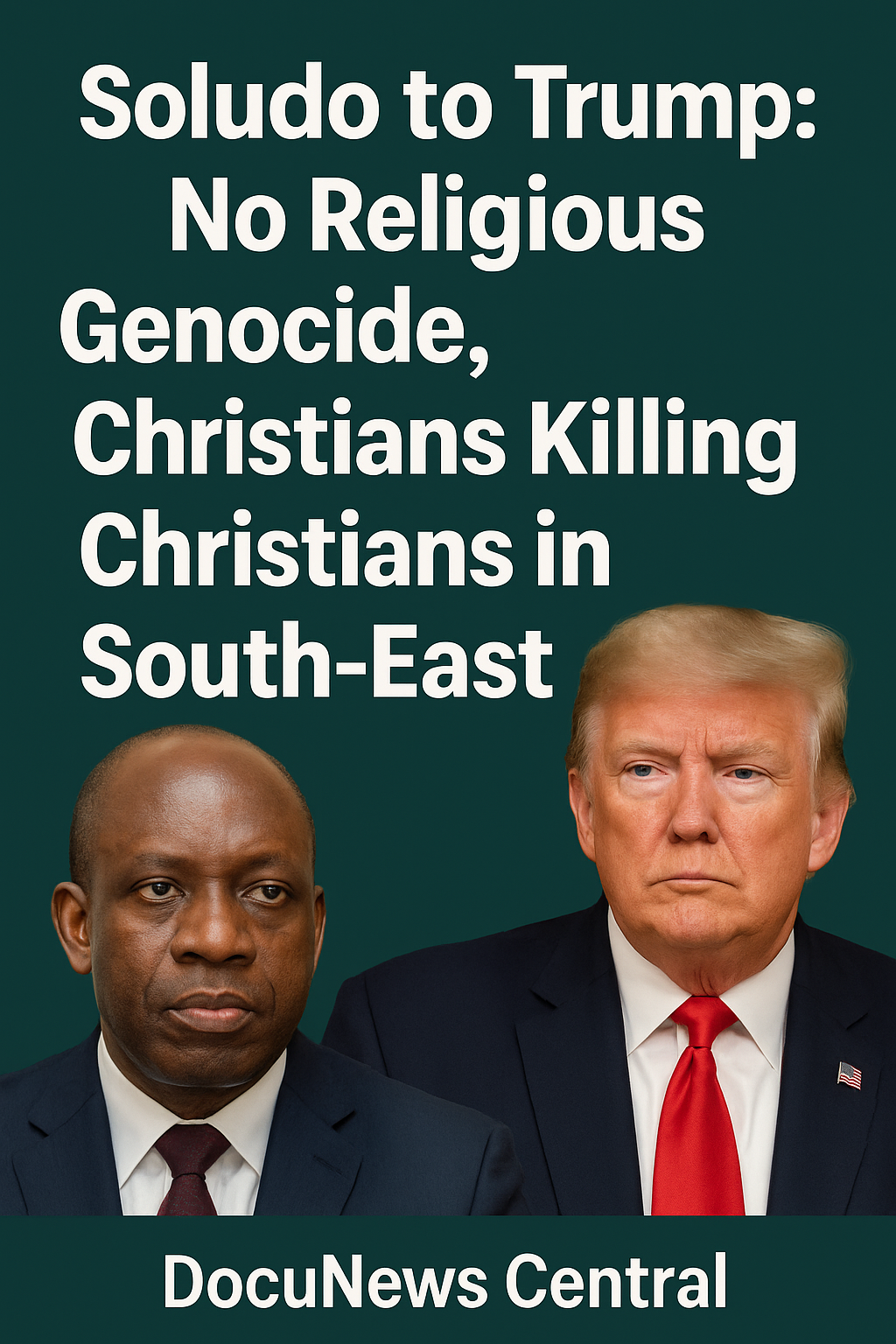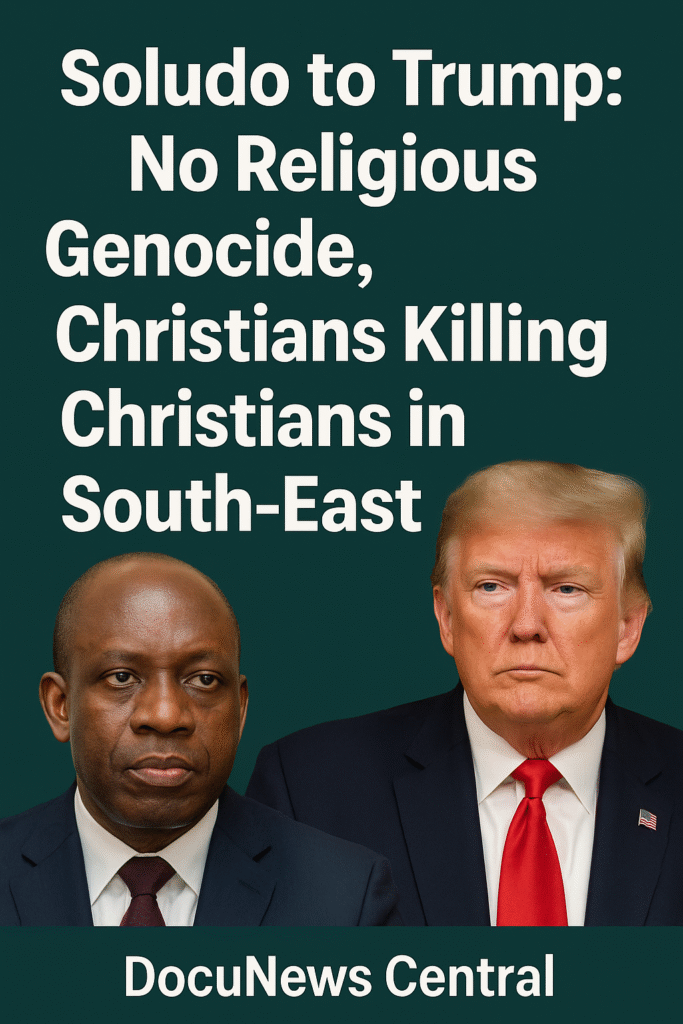

Soludo to Trump: No Religious Genocide, Christians Killing Christians in South-East
Governor Charles Chukwuma Soludo of Anambra State has dismissed claims of a religious genocide in Nigeria’s South-East. The governor told former U.S. President Donald Trump that the crisis in the region is not about religion. Instead, it involves criminals and armed groups, many of whom are Christians themselves.
Soludo’s Response to Trump’s Claims
Donald Trump recently suggested that Christians in Nigeria face a systematic extermination. He even hinted that the United States might consider intervention to protect them. In response, Governor Soludo said such statements are misleading and harmful.
He explained that the killings in the South-East are mostly carried out by people who bear Christian names like Peter, John, and Emmanuel. According to him, “In this region, it is Christians killing Christians, not Muslims killing Christians.”
Soludo added that the South-East is about 95% Christian. Therefore, labeling the crisis as a religious war is inaccurate. He urged global leaders to avoid painting Nigeria with a false narrative that could escalate tension.
Violence in South-East Nigeria: Not About Faith
The Anambra governor clarified that the insecurity in the region is linked to criminality, cultism, and youth unemployment, not religion. He noted that many armed men hide in forests and target communities, traders, and travelers.
These criminals, he said, destroy lives and businesses while pretending to fight for justice. Soludo insisted that their motives are personal, not religious or political.
He further stressed that the real enemies of progress are within, not outside. Therefore, he called on local leaders, traditional rulers, and community members to unite against insecurity.
Soludo Calls for Dialogue and Introspection
Governor Soludo encouraged dialogue as the only way to end violence. He advised that peace cannot come through blame or foreign interference. Instead, communities should take responsibility for their safety and future.
According to Soludo, “We need conversation, not condemnation. We must talk to ourselves and understand where we went wrong.”
He emphasized that the South-East must stop viewing every act of violence as persecution. The problem, he said, lies in crime, poor governance, and social neglect.
Security, Sovereignty, and the Need for Facts
Soludo also addressed Nigeria’s sovereignty. He warned against threats of foreign invasion based on false assumptions. He pointed out that if the same logic were applied, Africa could have invaded the U.S. during the Black Lives Matter crisis.
His point was simple: No nation should interfere in another’s internal affairs without proper understanding. Nigeria’s challenges, though serious, must be solved by Nigerians.
He urged foreign media and human rights groups to focus on verified data before making sweeping conclusions about genocide or persecution.
Understanding the Real Causes of Violence
Experts agree that the South-East’s problems are multi-dimensional. The major causes include:
- Unemployment and frustration among the youth.
- Weak law enforcement and corruption.
- Proliferation of firearms and cult groups.
- Political exploitation and fake activism.
Governor Soludo is addressing these issues through community policing and the reactivation of forest guards. He believes local participation is key to restoring peace.
International Reaction and Local Responsibility
International observers have mixed opinions. Some Western commentators claim Christians are being targeted. However, Soludo’s statement challenges that idea with ground realities.
He reminded the world that Anambra and the wider South-East are mostly Christian. Therefore, external actors should not twist internal crises into religious conflicts. He appealed for accurate reporting and responsible diplomacy.
Internal Efforts to Restore Order
Soludo has launched several initiatives to restore peace in Anambra State. His administration is reforming local security outfits and empowering vigilante groups. These groups now operate in cooperation with the police and military.
He also announced the “Operation Udo Ga-Achi” campaign to reclaim forest territories from armed groups. This effort aims to end the culture of impunity that has plagued the region for years.
Soludo’s Message to Nigerians
Soludo’s message is clear: Nigeria must unite to solve its problems. Blaming religion will not end killings. Instead, the country should focus on rebuilding trust, jobs, and justice.
He warned that foreign powers cannot fix what Nigerians refuse to confront. “We must fix our home ourselves,” he said firmly.
His call reflects a growing belief that internal dialogue is more effective than external pressure.
Reactions from Citizens and Analysts
Many Nigerians support Soludo’s boldness. They believe his approach brings honesty to a sensitive issue. Others, however, feel that his comments downplay the suffering of victims.
Analysts suggest that while Soludo’s position might seem defensive, it promotes a realistic assessment. The key is to separate genuine religious persecution from organized crime and political violence.
Related News You Might Like
- WAEC 2026 Subject Combinations: Fact-Checked Update and Media Reports
- CAF’s New Qualification Format Gives Super Eagles a Fresh Chance
- Indian Plane Crash: What a Fellow Pilot Believed Caused It
- Customs Officer Dies in Hotel Room After Strange Incident
Conclusion
Governor Soludo’s response to Donald Trump redefines the narrative about violence in Nigeria’s South-East. By stating that “Christians are killing Christians,” he invites a deeper look into crime, governance, and truth.
For peace to return, Nigerians must face facts and reject foreign misinterpretations. The solution lies not in division but in unity, dialogue, and local action.
As Soludo said, “Let us heal our land ourselves.”






